Hair loss may seem to be a more noticeable problem in women. Most women notice hair fall in their 50s or 60s, but it can happen at any age and for a variety of reasons. Looking for the causes of hair loss in women and what is the best female hair loss treatment? We will answer all these questions in this blog post.
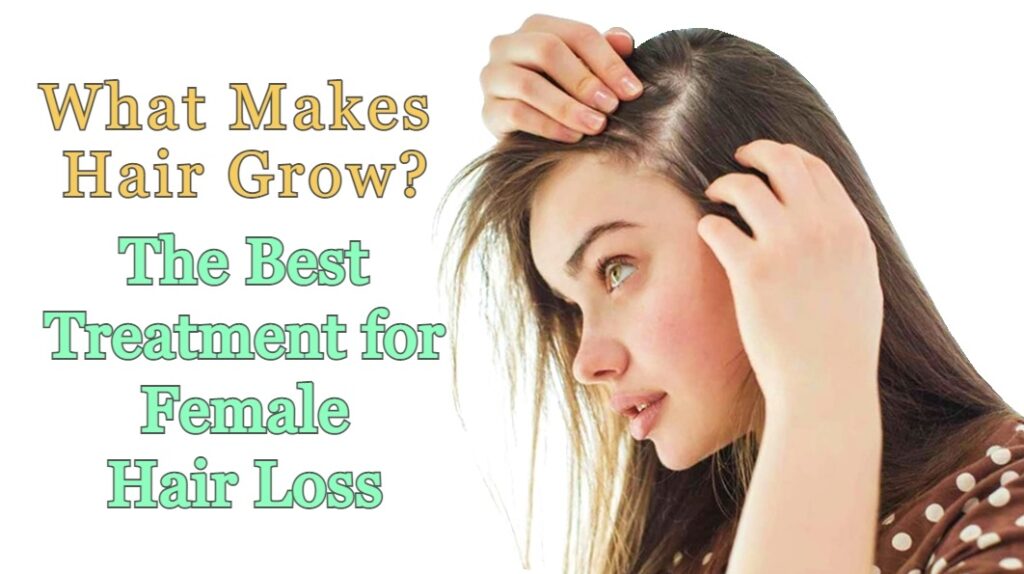
What Makes Hair Grow? The Best Treatment for Female Hair Loss
There are many ways to take care of your hair. In this article, we will present the best hair loss treatment for women.
Female Hair Loss
A woman’s hair is the title of her beauty, which highlights the beauty of her face. A woman without beautiful and healthy hair suffers from a major problem that may affect her psyche and her self-confidence.
For this reason, we see many women always seeking ways to contribute to obtaining thick and long hair, which in its beauty reflects its health, and the health of the body from the inside as well.
Unfortunately, the problem of hair loss that most women suffer from appears, and it constitutes an obstacle that worries many of them.
What are the Causes of Hair Loss in Women?
The reasons are many and varied, including what you may do daily and you are not aware that it is the cause of your hair loss. Some causes of hair loss are related to the nature of the hair itself and the environment around you.
The following are the main reasons that lead to hair loss.
Thyroid problems: The thyroid gland is a butterfly-shaped gland located in the front of the neck. It produces hormones that regulate many processes in the body, and if the gland produces more or fewer hormones, the hair growth cycle may be affected by this, but hair loss is rarely the only symptom of thyroid problems.
Sometimes hair loss occurs if the thyroid gland is not working properly. Hair loss may develop slowly with hyperthyroidism and hypothyroidism.
Pregnancy and lactation: Everything related to the change in hormones in your body can be the cause of your hair loss, and in the periods of pregnancy and lactation, the hormones and their rates change. Although some women do not experience hair loss during pregnancy, their hair density may increase during this period, they lose a lot of hair during breastfeeding.
Polycystic Ovarian Syndrome (PCOS): Women with PCOS also have a chronic hormonal imbalance, in which the body overproduces estrogen, often leading to:
- Excessive hair growth on the face and body.
- Thinner hair growth on the scalp.
- Ovulation problems.
- Acne and pimples
- Overweight.
But sometimes hair thinning may be the only sign of this problem.
Tinea capitis: When tinea capitis affects the scalp, the fungus causes specific hair loss in which the scalp appears as empty, irritated, itchy circles, often red due to irritation.
Tinea capitis can be treated with appropriate antifungal medication, and the fungus spreads easily through direct contact, so the patient’s family members should check if they have any symptoms.
Aging: As we age, the number of hairs that fall from our heads daily increases, so it is natural that most women notice an increase in the rate of hair loss in their fifties. But there are several ways and solutions to treat hair loss for women at this stage.
Genetic factors: Genetic factors are one of the most important causes of hair loss. A girl or woman does not suffer from any problem that can lead to hair loss, and she takes care of her hair in the right way, however, she finds that she suffers from permanent hair loss. In this case, the most likely cause of hair loss is the genetic factor.
Birth control pills: One of the side effects of birth control pills is the possibility of hair loss. Hormones that inhibit ovulation may lead to hair thinning in some women, especially in women with a family history of hair loss.
And sometimes hair loss begins when you stop taking birth control pills, and other medications that may lead to hair loss are:
- Blood thinners.
- Medications to treat high blood pressure.
- Heart disease medications.
- Arthritis medications.
- Depression medications.
Experts believe that genetics and aging play an important role in hair loss along with the hormonal changes that occur during menopause. And the hair may become thinner all over the head, and the hairline receding from the forehead area is rare in women.
Some diseases: When the body is exposed to disease, even if it is simple, this negatively affects the health of the hair. Exposure to accidents, surgeries, and even some influenza can cause hair loss, but temporarily. There are also some skin diseases that cause hair loss, but permanently if not treated, such as alopecia areata.
Vitamin A excess: It is known that vitamins are very important for the body, which makes us resort to some nutritional supplements to help us enjoy better health, but everything must be in the right amount. As some studies have proven that a high percentage of vitamin A in the body can be a major cause of hair loss in women.
Unhealthy and Improper diet: This digital era is characterized by speed, everything became fast, even meals. Many resort to eating ready-made and fast foods that lack nutrients important for human health, and thus for hair health.
Studies have proven that not eating enough protein daily affects hair health and can lead to hair loss because the main component of hair is protein.
Rapid weight loss: Hair loss is one of the most important side effects of rapid weight loss. Many who resort to harsh diets and chemical diets experience high rates of hair loss. This is because the body’s lack of important nutrients during these diets leads to the weakness of the body and thus to the weakness of the hair and subject to hair loss.
Hairdressing tools: The way you style your hair daily can cause it to fall out. If you style it while it is wet or you use metal or plastic combs, you are more prone to hair loss. This is because the hair when it is wet is weaker and can easily separate from the follicle.
Drying hair: Also, the way you dry your hair can cause it to fall out. If you use an electric hairdryer on a regular basis, this can lead to hair loss.
Also, if you use the towel violently on your hair, as well as electrical devices for straightening and curling hair can be a direct cause of hair loss.
After we have presented the most important causes of hair loss, we must offer the best hair loss treatments for women.
Best Female Hair Loss Treatment Options
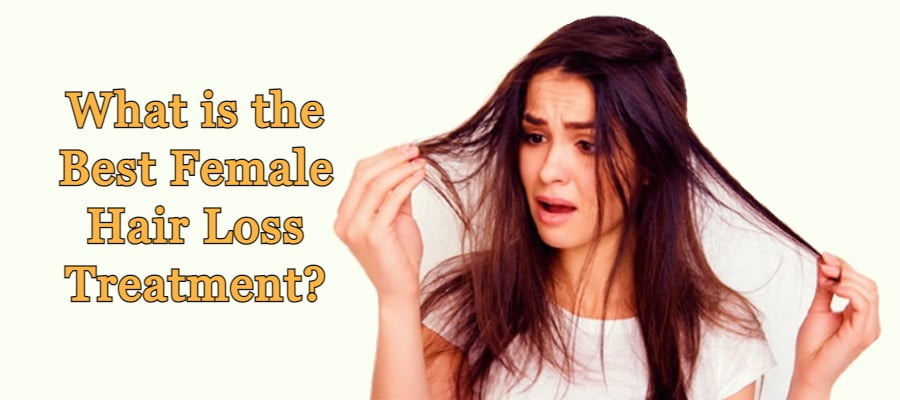
Treatment options for female hair loss are many and varied and differ in technology and costs.
There are home remedies with natural ingredients, and there is a method of drug treatment, then there is the laser technology, and sometimes surgery can be used as a solution to the problem of hair loss in women.
Here are some of the best methods used for female hair loss treatment.
Medical treatment of female hair loss
Those who do not consider home remedies a real treatment, or those prescriptions did not bring the required results, resort to drug therapy.
The medical treatment of hair loss for women is divided into two parts, the first is topical paints and solutions, and the other is oral drugs.
The most famous drug treatments used to treat hair loss for women are minoxidil (Rogaine), and Aldactone (spironolactone).
Rogaine is an FDA-approved topical medication for hair loss in men and women and to regrow hair.
Aldactone is an oral medication to restore the hormone balance and treat hair loss and baldness in adults. Doctors may prescribe it as an “off-label” medication because it is not approved specifically for hair loss treatment.
Laser treatment for hair loss in women
The laser showed great results in the treatment of hair loss because the laser is often the safest method of treatment, so many women may prefer to use it as a solution to hair loss for women.
Although the laser is used in the process of hair removal, there are many types of laser devices. The type of device used for hair removal is completely different from the type of device used to treat hair loss.
The first helps the atrophy of the follicle, while the second works to stimulate blood flow to the follicles, and thus the germination of new hairs.
Also, laser beams help reduce inflammation in the scalp, which can be one of the causes of hair loss, and thus reduce the rate of hair loss.
Surgical treatment of femal hair loss
If the previous methods did not work in combating hair loss in women, then surgical intervention is inevitable. In some cases, the doctor decides, after consulting the girl or woman, that hair transplant surgery is the best solution for her.
Hair transplantation for women is a surgical process in which hairs are implanted, either natural or artificial, in the empty places in the scalp.
There are two types of hair transplantation: Follicular Unit Transplant (FUT) and Follicular Unit Extraction (FUE).:
- Follicular unit transplantation: It is the oldest and cheapest method. A thin part of the scalp is taken with the follicles, divided into small slices, then treated and replanted in the affected areas.
- Follicular unit extraction: It is the newest and most expensive method, but preferred by many, in which follicles are extracted with their hairs, and replanted in places that suffer from hair loss.
In both cases, hair transplantation must be only from the frontal areas of the scalp, so that the donor area is abundant with hair. But if hair loss is widespread in the entire scalp, only artificial hair transplantation will work in this case.
Artificial/Synthetic Hair Implantation
In this method of treating hair loss for women, artificial hairs made of natural hair-like fibers of different colors and lengths are implanted.
The woman or girl can choose the color and length of the hair that suits her as well as her nature in terms of whether it is smooth or curly, because synthetic hair is not subject to dyeing, straightening or curling, and it does not grow in the case of its shortening.
The results of artificial hair transplantation last for no more than two years, then all the transplanted hair falls out and the woman needs to re-plant again.
Natural Home Remedies to Prevent Hair Fall
Despite the simplicity of home remedies for hair fall and regrowth and their low costs, they sometimes prove effective, and some resort to these recipes as a solution to the problem of hair loss for women.
As their ingredients are natural and available everywhere, and these recipes sometimes bring good results, but after a period of continuous use, these methods may take a long period of time, which is not preferred by some. The duration of treatment can last for many months and sometimes a whole year for the results to appear, and also that long period can pass without any noticeable result. This is due to the nature of the hair of the girl or the lady herself to receive and interact with those recipes.
The cause of hair loss is also a key factor in the success of these traditional methods as a solution to hair loss in women, and one of the most famous natural recipes for female hair loss treatment is to massage the scalp with castor oil or almond oil day after day. The use of aloe vera extract helps stimulate the growth of new hairs.
Garlic is also used on the scalp to stimulate hair follicles and contains selenium, which eliminates dandruff on the scalp.
Garlic is used in its correct form or with natural oils such as olive oil or coconut oil, then it is used as an oil bath, taking into account the washing of the hair afterwards with a natural shampoo free of harmful chemicals.
Tips to Stop Hair Loss
There are many things that must be followed to prevent hair fall or treat the problem of hair loss, including:
Maintain a healthy hair care routine: Washing hair with water and a mild shampoo in moderation, not on a daily basis, helps to promote the health and strength of hair, and prevent it from falling out.
Avoid using hairdressing tools and hair dryers: Hairdressing tools cause hair to be exposed to problems and fall, so you must let the hair dry on its own, and avoid drying it with a hair dryer.
Eat a healthy, balanced diet: Eat healthy foods that contain vitamins, minerals and iron, such as vegetables and fruits, to reduce hair loss and promote healthy hair.
Maintain a healthy lifestyle: Being healthy should be a part of your overall lifestyle. Get enough good sleep. Exercise regularly and be physically active. Drink more water and stay hydrated. Limit sugary drinks and unhealthy foods. And quit smoking as soon as possible because smoking can damage your hair follicles and increase the risk of hair loss.
Read Also: What is the Best Hair Loss Treatment for Men?

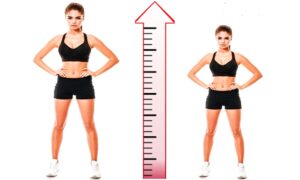

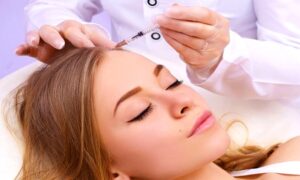
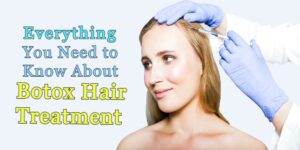
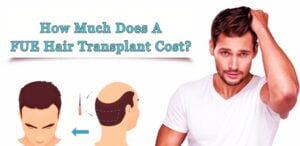
[…] Read Also: What is the Best Female Hair Loss Treatment? […]
[…] transplantation is one of the effective methods of hair loss treatment for men as well as female hair loss treatment. In general, the FUE hair transplant technique is one of the easy techniques in the world of […]